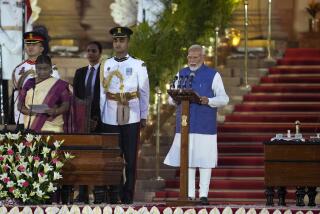Hand-Over Applauded in Kenya
NAIROBI, Kenya — More than 100,000 Kenyans roared their approval as Mwai Kibaki was sworn in as their president Monday, watching history in the making as autocrat Daniel Arap Moi bowed out after almost a quarter-century in power.
Many people climbed up trees and lampposts in Nairobi’s Uhuru Park to witness the inauguration of the man they are counting on to rebuild this once-prosperous East African nation. Kibaki, 71, a former vice president and finance minister, promised not to disappoint them.
The crowd jeered and heckled Moi as he arrived and sat next to his successor. Moi listened stone-faced as Kibaki highlighted the failings of his government.
“I am inheriting a country which has been badly ravaged by years of misrule and ineptitude,” Kibaki told the crowd. “You have asked me to lead this nation out of the present wilderness and malaise on to the promised land, and I shall do so.”
When Kibaki told the crowd that government should not be a burden on the people, one man shouted, “Tell him!” and pointed at Moi.
“We never dreamed of this day,” said Esther Macharia, 31, a secondhand-clothes seller in the crowd.
“We have a new beginning in Kenya,” she said, smiling excitedly.
Kibaki pledged to create jobs for millions of unemployed, provide free primary education and lead a government that won’t be run on the “whims of individuals.”
Kibaki’s National Rainbow Coalition won a landslide victory in elections Friday, defeating Moi’s handpicked candidate, Uhuru Kenyatta, and ending 39 years of rule by the Kenya African National Union.
In Washington, State Department spokesman Philip T. Reeker welcomed the election as having been free and fair. He praised Moi and Kibaki for an orderly change in Nairobi.
Moi, 78, was forced to step down by a 1991 constitutional amendment that limits presidents to two five-year terms. In complying, he paved the way for a peaceful transfer of power, rare in Africa.
Many Kenyans blame Moi, whose blanket use of patronage resulted in crippling mismanagement, for the culture of corruption that has plunged Kenya into its worst economic crisis since independence from Britain in 1963 and frightened away much-needed foreign investors.
More than half the population of 30 million lives on less than $1 a day.
“It’s a great day in the history of Kenya because it’s like a second independence for Kenya. For the first time, our wishes as an electorate have gone through successfully,” said Ferdinand Makokha, 26, an office messenger. “It’s been a dream for every Kenyan.”
Kibaki was Moi’s vice president from 1978 to 1988.
More to Read
Sign up for Essential California
The most important California stories and recommendations in your inbox every morning.
You may occasionally receive promotional content from the Los Angeles Times.










